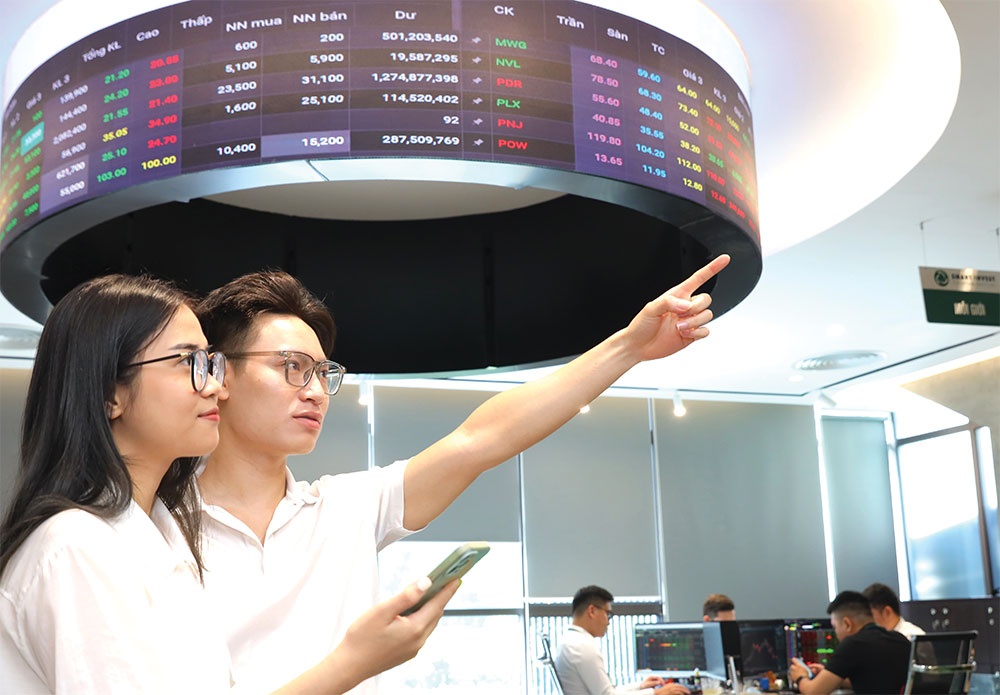Hurdles still to climb for stock market gain
 |
| Vietnam’s stock market system has been improved in recent times through more transparent management, Photo: Le Toan |
At a seminar in March on the strategy for development of Vietnam’s securities market for this decade, Shimizu Akira, chief representative of the Japan International Cooperation Agency (JICA) in Vietnam said it is urgent to improve the fairness and transparency of the domestic market for Vietnam’s stock sector to become a more attractive and efficient capital mobilisation channel.
“The Vietnamese government has made strides and implemented swift remedies to the issue, including on the revised Law on Securities and launching the Vietnam Stock Exchange,” Akira said.
Based on the proposal of the Vietnamese government, JICA has implemented a technical cooperation project to strengthen the capacity of the State Securities Commission (SSC) and the three stock exchanges through providing practical knowledge and know-how on the regulatory activities in Japan and other advanced capital markets to upgrade Vietnam’s equity market in accordance with international standards, Akira explained.
“The market capitalisation value exceeded $180 billion as of the end of 2020. Meanwhile, many foreign investors are ramping up their presence in the domestic equity landscape thanks to vast potential, including Japanese investors,” he said.
The JICA project has also focused on securities market surveillance and inspection, supervision of market intermediaries, listing and public offerings in line with international standards, and raising awareness of investor protection among listed companies.
Aiming to cooperate with counterparts to develop the best practices for Vietnam’s securities market, the project conducted a detailed initial survey on the Vietnamese market and grasped issues and directions for their solutions, and then implemented training programmes, consultation and seminars.
Moreover, the project has supported through consultation the drafting of various decrees and circulars under the Law on Securities, enacted in 2019.
According to Pham Hong Son, vice chairman of the SSC, Vietnam’s stock market is in a new growth era, but still facing significant obstacles.
“The SSC will move on to the next initiative of strengthening capacity and promoting efficiency in Vietnam’s stock market, with the support of JICA scheduled to begin from April 2024,” he said. “Thus, the strategic cooperation between the Japanese and Vietnamese stock markets will become more meaningful. The domestic stock market has showing signs of improvement over the past few years, with a more transparent market supervision and management mechanism.”
According to fresh statistics compiled by the SSC, there are a total of nearly seven million trading accounts on the domestic market, equivalent to around 7 per cent of the Vietnamese population.
Kojima Kazunobu, chief consultant at the Daiwa Institute of Research, believed that this figure is high and a positive sign for the future of Vietnam’s stock market. However, to effectively develop, he suggested improving overall market liquidity.
Regarding the Vietnamese stock market’s long-awaited upgrade, Kazunobu said that MSCI’s assessment of the market was based on the criteria of accessibility for foreign investors.
“I think the biggest and the most fundamental issue for Vietnam’s stock market is the foreign ownership limit (FOL) and the foreigner upper limit ratio as stipulated in the Articles of Incorporation. Other barriers, such as a lack of English disclosure from listed companies and the difference of Vietnamese accounting standards compared to international ones, are relatively minor compared to the FOL issue,” Kazunobu told VIR.
Kazunobu added that there were a number of international practices from Japan and other advanced markets which could be adopted in Vietnam, including utilisation of self-regulatory organisations for upgrading market intermediaries, strengthening of listing examinations incorporating qualitative listing examination for raising the quality of listed companies, and international standard underwriting and book building in public offerings for promoting fundraising activities.
Vu Chi Dung, director of International Cooperation Department at the SSC, said that the stock market development strategy towards 2030 included increasing the outstanding balance of the bond market and the derivatives market by an average of 20-30 per cent annually from 2021-2030.
Furthermore, the agency has also set the target to enhance the participation of institutional, professional, and foreign investors, while improving corporate governance quality and implementing environmental, social, and governance standards.
“Upgrading Vietnam’s stock market from a frontier market to an emerging market is also a critical target in the coming years. In addition, we aim to reach the top four markets in ASEAN by 2025,” Dung said.
 | Foreign investment funds plan to pour money into Vietnamese stocks Many billion-dollar investment funds have the intention to pour money into the Vietnamese stock market, an event held by VIR has heard. |
 | Stable lenders to lead to interest in stocks Identifying the risk factors of the banking system can open up prospects to invest in banking stocks this year, industry experts are saying, while banks themselves are urged to take provisioning activities into consideration. |
 | Stock market violations to face stricter sanctions The State Securities Commission (SSC) will review the Law on Securities and related decrees to complete the legal framework, and strengthen sanctions for violations to protect the legitimate rights and interests of investors. |
What the stars mean:
★ Poor ★ ★ Promising ★★★ Good ★★★★ Very good ★★★★★ Exceptional
Related Contents
Latest News
More News
- Raised ties reaffirm strategic trust (February 20, 2026 | 14:06)
- Sustained growth can translate into income gains (February 19, 2026 | 18:55)
- The vision to maintain a stable monetary policy (February 19, 2026 | 08:50)
- Banking sector faces data governance hurdles in AI transition (February 19, 2026 | 08:00)
- AI leading to shift in banking roles (February 18, 2026 | 19:54)
- Digital banking enters season of transformation (February 16, 2026 | 09:00)
- IFC to grant $150 million loan package for VPBank (February 13, 2026 | 09:00)
- Nam A Bank forms position as strategic member at VIFC through three key partnerships (February 12, 2026 | 16:39)
- Banks bolster risk buffers to safeguard asset quality amid credit expansion (February 12, 2026 | 11:00)
- VNPAY and NAPAS deepen cooperation on digital payments (February 11, 2026 | 18:21)

 Tag:
Tag:




















 Mobile Version
Mobile Version